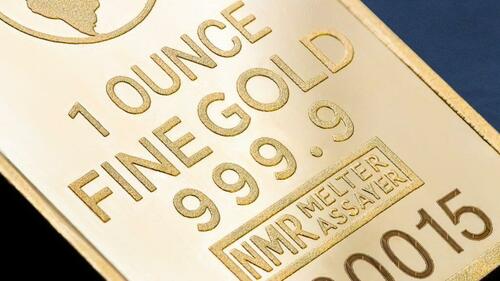Gold Is Migrating From West To East
Authored by Michael Maharrey via SchiffGold.com,
Gold is migrating from the West to the East.
As Bloomberg described it, many western investors – particularly at the institutional level – are dumping bullion. Meanwhile, Asian buyers are taking advantage of lower prices to snap up less expensive jewelry, coins, and bars.
According to the Bloomberg report, “large volumes of metal are being drawn out of vaults in financial centers like New York and heading east to meet demand in Shanghai’s gold market or Istanbul’s Grand Bazaar.”
In fact, Asian suppliers are having a difficult time getting enough bullion into Asian markets. As a result, there has been a significant increase in premiums in many Asian countries. September’s average premium in China reached the highest monthly level for nearly six years.
“The incentive to hold gold is a lot lower. It’s going from west to east now,” MKS PAMP SA head of trading Joseph Stefans told Bloomberg.
“We are trying to keep up as best we can.”
New York and London vaults have reported an exodus of more than 527 tons of gold since the end of April, according to data from the CME Group and the London Bullion Market Association. At the same time, gold imports into China hit a four-year high in August.
India, Turkey, Thailand and Saudi Arabia have also reported increased imports of gold.
There is also growing demand for silver in Asian markets, particularly India. The premium on silver has tripled in recent months.
We also see the Asian appetite for gold in central bank purchases. Central banks globally have been net gold buyers for five straight months and all of the big purchases have been in the East.
Turkey has added more gold to its reserves in 2022 to date than any other country. With an 8.9-ton purchase in August, Turkey had increased its gold reserves by 84 tons through the first eight months of the year. Turkey now holds 478 tons of gold between its central bank and treasury holdings, the highest level since Q2 2020.
The Reserve Bank of India has also been a big buyer in 2022. Its total gold reserves now stand at 782.7 tons, ranking it as the ninth-largest gold-holding country in the world. Since resuming buying in late 2017, the Reserve Bank of India has purchased over 200 tons of gold. In August 2020, there were reports that the RBI was considering significantly raising its gold reserves.
Other big gold buyers in 2022 include Kazakhstan, Uzbekistan, Qatar and Iraq.
In the East, many people still use gold as their primary form of savings and wealth preservation. An article published by Seeking Alpha summarizes this dynamic.
For millions of people in Asia gold still is the ‘basic form of saving.’ In contrast to the West, where financialization started decades ago, and gold has slowly been removed from people their day-to-day lives. Until a financial crisis emerges, that is. In the West, people own little or no physical gold when they feel financially confident. People in the East have retained a long-term view concerning gold. Their ancestors saved in gold, and so have they been taught. With the knowledge that ultimately, gold doesn’t lose its purchasing power.”
For instance, Indian households own an estimated 25,000 tons of gold and that number may be higher given the large black market in the country. Gold is not just a luxury in India. Even poor people buy gold in the Asian nation. According to an ICE 360 survey in 2018, one in every two households in India purchased gold within the last five years. Overall, 87% of households in the country own some amount of the yellow metal.
So, while investors in the West are dumping gold as the price falls, investors in the East are taking advantage of the relatively low prices (even though gold is more expensive in many non-dollar fiat currencies) and gobbling up gold as inflation eats away at the value of their local currencies.
Tyler Durden
Wed, 10/19/2022 – 06:30

